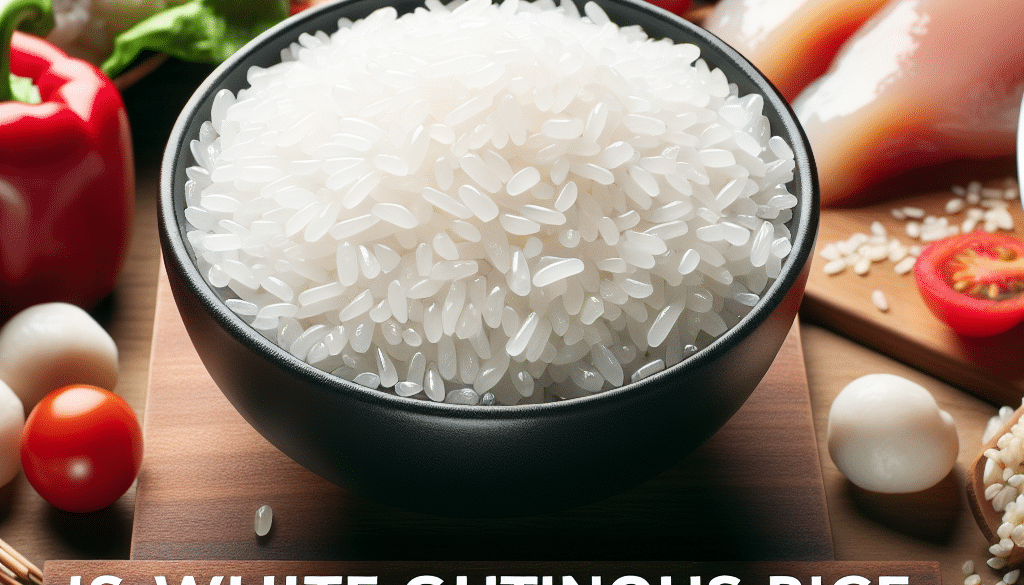Is White Glutinous Rice Healthy?
-
Table of Contents
- White Glutinous Rice: A Comprehensive Health Analysis
- Nutritional Profile of White Glutinous Rice
- Health Benefits of White Glutinous Rice
- Potential Drawbacks of White Glutinous Rice
- White Glutinous Rice vs. Other Rice Varieties
- Incorporating White Glutinous Rice into a Healthy Diet
- Case Studies and Statistics
- Conclusion: Is White Glutinous Rice Healthy?
- Discover ETprotein’s High-Quality Protein Products
White Glutinous Rice: A Comprehensive Health Analysis

White glutinous rice, also known as sticky rice or sweet rice, is a staple in many Asian cuisines, particularly in Southeast Asia. It is known for its unique sticky texture when cooked, which is a result of its high starch content. Despite its popularity, there has been an ongoing debate about the health implications of consuming white glutinous rice. This article delves into the nutritional profile of white glutinous rice, its health benefits, potential drawbacks, and how it compares to other types of rice.
Nutritional Profile of White Glutinous Rice
Understanding the nutritional content of white glutinous rice is crucial to evaluating its health impact. White glutinous rice is primarily composed of carbohydrates, with a small amount of protein and negligible fat. It is also low in fiber since it is typically milled and polished, which removes the outer bran layer.
- Carbohydrates: The primary source of energy in white glutinous rice.
- Protein: Contains a modest amount of protein, essential for body repair and growth.
- Fiber: Lacks significant fiber due to the removal of the bran layer.
- Vitamins and Minerals: Provides minimal essential nutrients, with some varieties being enriched with vitamins and minerals.
Health Benefits of White Glutinous Rice
Despite its simple composition, white glutinous rice does offer some health benefits:
- Easy Digestibility: Its lack of fiber makes it gentle on the digestive system, which can be beneficial for individuals with digestive issues.
- Gluten-Free: Naturally gluten-free, it is a safe option for those with celiac disease or gluten intolerance.
- Energy Source: The high carbohydrate content provides a quick source of energy, making it ideal for athletes or those needing a fast energy boost.
Potential Drawbacks of White Glutinous Rice
However, there are several potential health concerns associated with white glutinous rice:
- High Glycemic Index (GI): It can cause rapid spikes in blood sugar levels, which is a concern for individuals with diabetes or those at risk.
- Low Nutrient Density: The milling process strips away many nutrients, leaving it less nutritious than whole grains.
- Limited Satiety: The lack of fiber may lead to less satiety, potentially contributing to overeating.
White Glutinous Rice vs. Other Rice Varieties
When compared to other types of rice, such as brown rice or wild rice, white glutinous rice falls short in terms of nutritional value. Brown rice, for instance, retains its bran and germ, offering more fiber, vitamins, and minerals. Wild rice, which is not technically rice but a grass, boasts a higher protein content and a richer nutrient profile.
Incorporating White Glutinous Rice into a Healthy Diet
While white glutinous rice may not be the healthiest option available, it can still be part of a balanced diet when consumed in moderation. Here are some tips for healthier consumption:
- Portion Control: Be mindful of serving sizes to avoid excessive carbohydrate intake.
- Mix with Other Grains: Combine white glutinous rice with other whole grains to increase the overall nutrient density of your meal.
- Balanced Meals: Pair it with lean proteins, vegetables, and healthy fats to create a more balanced and nutritious dish.
Case Studies and Statistics
Research on the health effects of white glutinous rice is limited. However, studies on white rice consumption in general suggest that high intake may be associated with an increased risk of type 2 diabetes. A Harvard study found that replacing white rice with whole grains could lower diabetes risk by 36%. Additionally, a meta-analysis published in the British Medical Journal indicated that each serving per day of white rice was associated with an 11% increase in the risk of diabetes in the overall population.
Conclusion: Is White Glutinous Rice Healthy?
In conclusion, white glutinous rice is a carbohydrate-rich food with limited nutritional benefits. Its high glycemic index and low fiber content may not make it the best choice for those with specific health concerns or dietary goals. However, when consumed in moderation and as part of a varied diet, it can still be enjoyed without significant health risks. It is essential to balance its intake with other nutrient-dense foods to ensure a well-rounded diet.
Discover ETprotein’s High-Quality Protein Products
If you’re looking to enhance your diet with high-quality protein sources, consider exploring ETprotein’s range of organic bulk vegan proteins. Their products, including Organic rice protein and other plant-based proteins, offer a neutral taste and are non-GMO and allergen-free. With L-(+)-Ergothioneine purity over 98%, ETprotein caters to various industries, ensuring that you can find the perfect addition to your health and wellness routine.
About ETprotein:
ETprotein, a reputable protein and L-(+)-Ergothioneine (EGT) Chinese factory manufacturer and supplier, is renowned for producing, stocking, exporting, and delivering the highest quality organic bulk vegan proteins and L-(+)-Ergothioneine. They include Organic rice protein, clear rice protein, pea protein, clear pea protein, watermelon seed protein, pumpkin seed protein, sunflower seed protein, mung bean protein, peanut protein, and L-(+)-Ergothioneine EGT Pharmaceutical grade, L-(+)-Ergothioneine EGT food grade, L-(+)-Ergothioneine EGT cosmetic grade, L-(+)-Ergothioneine EGT reference grade and L-(+)-Ergothioneine EGT standard. Their offerings, characterized by a neutral taste, non-GMO, allergen-free attributes, with L-(+)-Ergothioneine purity over 98%, 99%, cater to a diverse range of industries. They serve nutraceutical, pharmaceutical, cosmeceutical, veterinary, as well as food and beverage finished product distributors, traders, and manufacturers across Europe, USA, Canada, Australia, Thailand, Japan, Korea, Brazil, and Chile, among others.
ETprotein specialization includes exporting and delivering tailor-made protein powder and finished nutritional supplements. Their extensive product range covers sectors like Food and Beverage, Sports Nutrition, Weight Management, Dietary Supplements, Health and Wellness Products, and Infant Formula, ensuring comprehensive solutions to meet all your protein needs.
As a trusted company by leading global food and beverage brands and Fortune 500 companies, ETprotein reinforces China’s reputation in the global arena. For more information or to sample their products, please contact them and email sales(at)ETprotein.com today.












